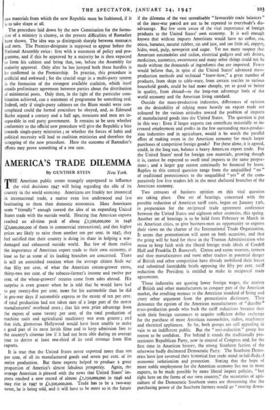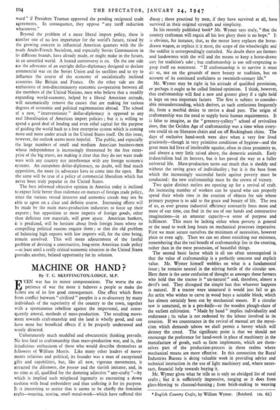AMERICA'S TRADE DILEMMA
By GUNTHER STEIN New York. THE American public seems strangely unprepared to influence the vital decisions 7947 will bring regarding the role of its country in the world economy. Americans are frankly not interested in international trade, a matter even less understood and leis fascinating to them than domestic economics. Most Americans seem "friendly" enough toward the idea of an expanding United States trade with the outside world. Hearing that American exports reached an all-time peak of about £2,500,000,000 in 7946 (£2,000,00o,000 of them in commercial transactions), and that higher prices are likely to raise them another ten per cent. in 5947, they feel satisfied that their country is doing its share in helping a war- damaged and exhausted outside world. But few of them realise the importance of American export -trade to their own economy, at least so far as some of its leading branches are concerned. There is still an astonished reaction when the average citizen finds out that fifty per cent, of what the American cotton-grower earns, thirty-two per cent. of the tobacco-farmer's income and twelve per cent. of the wheat-growers' returns come from sales abroad. His surprise is even greater when he is told that he would have had to pay twenty-five per cent. more for his automobile than he did in pre-war days if automobile exports to the extent of ten per .cent. of total production had not taken care of a large part of the motor manufacturers' overhead costs ; that his own price advantage from the export of some twenty per cent. of the total production of machine tools and agricultural machinery was even greater ; and that rich, glamorous Hollywood would have been unable to make a good part of its most lavish films and to keep admission fees to the country's cinemas low if it had not been able during an average year to derive at least one-third of its total revenue from film exports.
It is true that the United States never exported more than ten per cent. of all its manufactured goods and seven per cent. of its entire production. But those exports helped to produce a great proportion of America's almost fabulous prosperity. Again, the average American is pleased with the news that United States' im- ports reached a new record of almost L1,250,000p00 in 7946 and may rise in 5947 to £7,5oo,000,000. Trade has to be a two-way street, he is being told, and it will have to be more so in the future if the dilemma of the vast unrealisable "favourable trade balances" of the inter-war period are not to be repeated to everybody's dis- advantage. But few seem aware of the vital importance of foreign products to the United States' own economy. It is well enough known that without imports Americans would have no coffee, tea, cocoa, bananas, natural rubber, tin and jute, and too little oil, copper, hides, wool, pulp, newsprint and sugar. Yet not many suspect that American automobiles and radios, electrical gadgets and soft drinks, medicines, cosmetics, sweetmeats and many other things could not be made without the thousands of ingredients that are imported. Fewer would believe that, in spite of the United States' advanced mass- production methods and technical "know-how," a great number of products, from ships to table-ware, from certain textiles to various household goods, could be had more cheaply, yet as good or better in quality, from abroad—to the long-run advantage both of the world economy and the American living standard.
Outside the mass-production industries, differences of opinion on the desirability of relying more heavily -on export trade are coloured by the various attitudes toward the problem of imports of manufactured goods into the United States. The question is put in this way: Even if larger exports can contribute materially to in- creased employment and profits in the few outstanding mass-produc- tion industries and in agriculture, would it be worth the parallel effort of making room in the American economy for much larger purchases of competitive foreign goods? For these alone, it is agreed, could, in the long run, balance a heavy American export trade. For the United States' need for foreign raw materials, growing though it is, cannot be expected to swell total imports to the same propor- tions ; and a larger gap cannot continually be financed by loans. Replies to this central question range from the uncivalified "no " of traditional protectionists to the unqualified " yes" of the com- paratively few free traders left in the most sheltered branches of the American economy.
Two censuses of business opinion on this vital question arc taking place. One set of hearings, concerned with the possible reduction of American tariff rates, began on January 73th, in preparation for the reciprocal trade agreement conference between the United States and eighteen other countries, this spring. Another set of hearings is to be held from February to March in six American cities, to give business-men an opportunity to express their views on the charter of the International Trade Organisation. It seems that protectionism will score on both occasions, and that the going will be hard for those in the Truman Administration who mean to keep faith with the liberal foreign trade ideals of Cordell Hull and Franklin D. Roosevelt. Cotton and rayon weavers, tanners and shoe manufacturers and most other traders in potential danger of British and other competition have already mobilised their forces and submitted formidable briefs opposing the fifty per cent. tariff reduction the President is entitled to make in reciprocal trade agreements.
Those industries are quoting lower foreign wages, the anxiety of British and other manufacturers to conquer part of the American market, the resulting menace to the American standard of living and every other argument from the protectionist dictionary. They denounce the egoism of the American manufacturers of " durable" mass-production goods who back the tariff reductions because they wish their foreign customers to acquire sufficient dollar exchange for the purchase of more American automobiles, radios, machinery and electrical appliances. So far, both groups are still appealing in vain to an indifferent public. But the " anti-reduction" group has reason to be confident. For behind it stands the traditionally pro- tectionist Republican Party, now in control of Congress and, for the first time in American history, the strong Southern faction of the otherwise badly decimated Democratic Party. The Southern Demo- crats have just reversed their historical free trade stand to full-fledg.A economic isolationism and protection. Stating that the hope of more stable employment for the American economy lies not in more exports, to be made possible by more liberal import policies, " but right here on the farms of our own country," the secretaries of agri- culture of the Democratic Southern states are threatening that the purchasing power of the Southern farmers would go " roaring down- ward " if President Truman approved the pending reciprocal trade agreements. In consequence, they oppose " any tariff reduction whatsoever."
Beyond the problem of a more liberal import policy, there is another one of no less importance for the world's future, raised by the growing concern in influential American quarters with the in- roads Anglo-French Socialism, and especially Soviet Communism in its different brands, have already made, or might make in the future, in an unsettled world. A heated controversy is on. On the one side ale the advocates of an outright dollar-diplomacy designed to declare commercial war on the Soviet Union and its satellites and to try to influence the course of the economy of socialistically inclined countries like Britain and France. On the other side are the enthusiasts of non-discriminatory economic co-operation between all the members of the United Nations, men who believe that a steadily expanding world-economy, helped by a liberal American attitude, will automatically remove the causes that are making for various degrees of economic and political regimentation abroad. The school of a new, " interventionist " dollar-diplomacy is opposed to any real liberalisation of American import policies ; but it is willing to spend a good deal of lending and even relief capital for the purpose of guiding the world back to a free enterprise system which is coming more and more under attack in the United States itself. On this issue, however, the outlook seems more hopeful. The public, and especially the large numbers of small and medium American business-men whose independence is increasingly threatened by the free enter- prise of the big trusts, are making it clear that they do not want trade wars with any country nor interference with any foreign economic systems. An outspoken dollar-diplomacy, no doubt, will find much opposition, the more its advocates have to come into the open. But the same will be true of a policy of commercial liberalism which has never been truly popular in the United States.
The best informed objective opinion in America today is inclined to expect little better than stalemate on matters of foreign trade policy, since the various vested interests and economic creeds may not be able to agree on a clear and definite course. Increasing efforts will be made by the main mass-production industries to force up their exports ; but opposition to more imports of foreign goods, other than deficient raw materials, will grow apace. American bankers, it is predicted, will be hesitant about fresh foreign loans where no compelling political reasons require them ; so that the old problem of balancing high exports with low imports will, for the time being, remain unsolved. This will mean adjournment of the fateful problem of devising a constructive, long-term American trade policy —at least until a really critical economic situation in the United States provides another, belated opportunity for its solution.



































 Previous page
Previous page